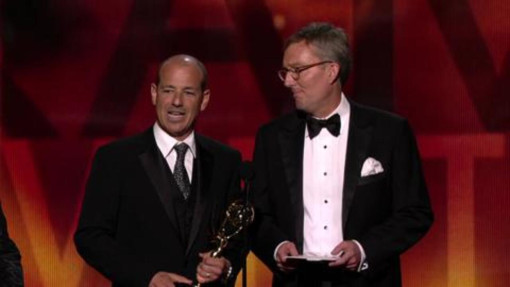If not for a caffeine fix, Lesli Linka Glatter might never have become one of television’s most sought-after directors.
The Dallas native had been pursuing a career in dance and choreography, which led her to a teaching gig in Tokyo. One morning, she decided to grab a cup of coffee and found herself in front of two cafés.
She opted for the one on the right, and “that was where I met this extraordinary man in his mid-70s,” she says. “We somehow recognized something in each other, and he started telling me stories about his life — stories that I knew I had to pass on in a way that I couldn’t do in dance.”
Eager to tell the man’s tales of various Christmas Eve occurrences, Linka Glatter came back to the U.S. and talked her way into the American Film Institute’s Directing Workshop for Women. What she learned helped her create Tales of Meeting and Parting in 1985.
To make the short film, she “did everything people tell you not to do.” It was a period piece, much of it in Japanese. She used flashbacks — and only one Caucasian actor. But she was determined.
“Once you get your chance, you have to be ready to knock it out of the park.”
That first attempt was a grand slam, landing her an Oscar nomination and then a job directing on the Steven Spielberg anthology series Amazing Stories.
Her TV debut was “like being tossed into the deep end,” she recalls. “My first day of shooting, I had maybe 200 guys storming a beach [in a scene set during] World War II. Still, it didn’t feel alien to me at all.”
From there, she began to work steadily on series like Twin Peaks and NYPD Blue but, despite her success, she felt something was missing — namely, other female directors.
“Women represented only 14 percent of the directors working in TV. I’d come from dance, and never thought about the possibility of discrimination,” says Linka Glatter. “The shocking thing is that we are still there.”
She is one of that small percentage of female TV directors who work regularly (17 percent in 2013–14), going from Gilmore Girls to Mad Men to her current job as an executive producer and director on Homeland (for which she received a directing Emmy nomination in 2013; she was also nominated as a director of Mad Men in 2010).
Her early success might be due to the elements of action in her first film and her first episode of Amazing Stories. She figures that producers “looked at that work and thought, ‘This is very testosterone-heavy, and not what we expect from a woman.’”
Such sexism isn’t necessarily deliberate, she acknowledges, but at the same time, “people in positions to do more diverse hiring need to do that.”
That’s why she supports mentoring programs such as the one she participated in for executive producer John Wells while directing series such as ER and West Wing. Aspiring women directors shadowed her for several episodes, with the guarantee that they would eventually be given an episode of their own.
For Linka Glatter, it’s simply a matter of making the best television possible.
“You have to reach out,” she says. “And when you do, it’s incredibly rewarding. There are great men directors out there, and there are also great woman directors. We’re all storytellers.
And opening things up for more women is only going to give [television] more perspective.”














